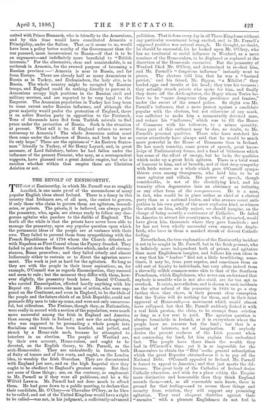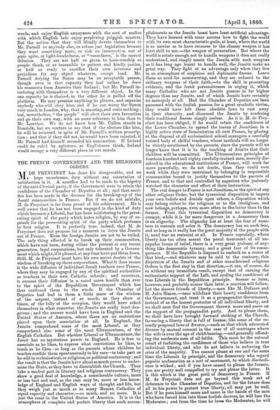THE REVOLT OF ENNISCORTHY.
THE riot at Enniscorthy, in which Mr. Parnell was so roughly handled, is one more proof of the unsoundness of many popular English ideas about Ireland. There is a fancy in this country that Irishmen are, of all men, the easiest to govern, if only those who claim to govern them are agitators, incendi- aries, or priests. The priests, it is believed, can always guide the peasantry, who, again, are always ready to follow any dan- gerous agitator who panders to the dislike of England. The truth all the while is that the priests have never been able to manage the peasantry, upon any popular question upon which the permanent ideas of the people are at variance with their own. They failed to prevent them from sympathising with the French Republicans of 1794 whom the Church detested, or with Napoleon as First Consul whom the Papacy dreaded. They failed to put down the Secret Societies which, under all circum- stances, Rome proscribes; and they failed utterly and almost ludicrously either to restrain or to direct the agrarian move- ment. The work is just as hard for the agitators. So long as they are with the people in their inner aspirations, as, for example, O'Connell was as regards Emancipation, they succeed and seem to rule ; but the moment they differ with them, how- ever slightly, the peasantry break loose. Daniel O'Connell, who carried Emancipation, effected hardly anything with his Repeal cry. His successors, the men of action, who were sup- posed on the Continent, and even in England, to be the idols of the people and the future chiefs of an Irish Republic, could not persuade fifty men to take up arms, and were not only unsuccess- ful, but ridiculous. The Fenians, though they, as Nationalists, were really in accord with a section of the population, were much more successful among the Irish in England and America than among the Irish in Ireland ; and now the arch-agitator, who was supposed to be persuading a whole people into Socialism and treason, has been hustled, and pelted, and struck by a Home-rule mob, because he attempted to interfere in an election. The people of Wexford are, by their own account, Home-rulers, and ought to be devoted, on the English theory, to Mr. Parnell, as the arch-Home-ruler. They are undoubtedly in favour both of fixity of tenure and of low rents, and ought, on the London idea, to worship the Irish Gracchus. They are discontented with England just now, and on the high Imperial view they ought to be obedient to England's greatest enemy. But they are none of these things ; are, on the contrary, as unpleasant to Mr. Parnell as if they were all publicans, and he a Sir
Wilfrid Lawspn. Mr. Parnell had not done much to offend them. He had gone down to a public meeting, to declare that their candidate, Mr. O'Clery—or Chevalier O'Clery, as he likes to be called, and out of the United Kingdom would have a right to be called—was not, in his judgment, a sufficiently-advanced politician. That is done every day in all Three Kingdoms without any particular resentment being excited, and in Mr. Parnell's supposed position was natural enough. He thought, no doubt, he should be successful, for he looked upon Mr. O'Clery, who has no territorial or social influence in Wexford, as a mere nominee of the Home-rulers, to be displaced or replaced at the discretion of the Home-rule executive. But the peasantry of Wexford liked Mr. O'Clery, and determined to re-elect him, and Mr. Parnell's "dangerous influence" instantly went to
pieces. The electors told him that he was a "bastard patriot," and his friend, Mr. Biggar, "a Nihilist ;" they hurled eggs and insults at his head ; they tore his trousers ; they actually struck priests who spoke for him, and finally they drove off the Arch-agitator, the Bogey whom Tories be- lieve to be "more dangerous than pestilence and famine," under the escort of the armed police. So slight was Mr. Parnell's influence, that a mere protest against a candidate popular with the electors but not otherwise of any mark, was sufficient to make him a momentarily detested man, and reduce his "influence," which was to fill the House of Commons with his followers, to a minus quantity. Some part of this outburst may be due, no doubt, to Mr. Parnell's personal qualities. Those who have watched his career attentively have always said that he would be much more powerful in the House of Commons than in Ireland. He has much tenacity, some power of speech, great know- ledge of Parliamentary forms, and a fund of bitterness which has some of the effect of energy, but he lacks the qualities which make up a great Irish agitator. There is a total want of humour in him, and of breadth, and of that deep sympathy with Irish nature as a whole which gave O'Connell sympa- thisers even among Orangemen, who held him to be at once agitator and villain. His power of speech, though considerable, is not of the electrifying kind, and his tenacity often degenerates into an obstinacy as irritating as any other form of the non-possranus. He is a man, in fact, who would be in place rather as chief of a clerical party than as a national leader, and who arouses secret anti- pathies in his own party of the most explosive kind, as witness the attack on him, wholly unjust, we should imagine, on the charge of being secretly a contemner of Catholics. He failed in America to attract his countrymen, who, if attracted, would have given him thousands where they gave hundreds ; and he has not been wholly successful even among the Anglo- Irish, who have in them a marked streak of devout Catholic feeling.
Nevertheless, the true explanation of the Enniscorthy incident is not to be sought in Mr. Parnell, but in the Irish peasant, who is infinitely more independent both of priests and agitators than most Englishmen imagine, and follows his own ideas in a way that his " leaders " find not a little bewildering, some- times, it may be, from pure caprice, and sometimes from an odd sort of loyalty to individuals, but very often indeed from a shrewdly selfish common-sense akin to that of the Southern Frenchmen, which Englishmen, who never can understand that anybody is sensible who is not also staid, are far too apt to overlook. It exists, nevertheless, and is shown in such incidents as the utter refusal of the peasantry in 1848 to go a step farther than they chose, in their present clear conception that the Tories will do nothing for them, and in their faint approval of Home-rule,—a movement which would almost have collapsed, but that Mr. Parnell suddenly linked it with a real Irish passion, the claim to be exempt from eviction as long as a low rent is paid. The agrarian question is always formidable in Ireland, as it is everywhere where the people have no resource but the land ; but that is a question of interests, not of imagination. If anybody denies the present coolness of the Irish peasant when not contending for land, let him explain this undoubted fact. The people have three times the wealth they had in O'Connell's time, yet it is as impossible for the Home-rulers to obtain the " Rint"—the general subscription which the great Repealer obtained—as it is to pay off the National Debt. O'Connell appealed to Ireland, Mr. Parnell is forced to appeal to America ; and that just marks the dif- ference. The great body of the Catholics of Ireland desire Catholic education, and wish for a place within the Empire more distinctive and honourable than they think England accords them—and, as all reasonable men know, there is
ground for that feeling—and to secure these things and security from eviction, they will support any promising agitation. They read eloquent diatribes against their " enemies " with a pleasure Englishmen do not feel in words, and enjoy English annoyance with the sort of malice with which English lads enjoy perplexing priggish masters. But the notion that they will blindly devote themselves to Mr. Parnell or anybody else, or refuse just legislation because they want something more, or risk an insurrection out of pure spite, or light-headedness, or "cussedness," is the merest delusion. They are not half so given to hero-worship as people think, or so insensible to patient and kindly justice, or half so ready to sacrifice their own interests and prejudices for any object whatever, except land. Mr. Parnell defying the Saxon may be an acceptable person, though even in that capacity they had rather he drew his resources from America than Ireland ; but Mr. Parnell in.- terfering with themselves is a very different object. In the one capacity he is chaired, in the other he is pulled off the platform. He may promise anything he pleases, and organise anybody who will obey him, and if he can worry the Saxon very much in London, why, that is amusing, and costs nothing ; but, nevertheless, "the people" will elect their own favourites and go their own way, with no more reference to him than to Mr. Lowther. We do not know how Mr. Callan stands in Dundalk, but we venture to say that if the electors like him, he will be returned, in spite of Mr. Parnell's written proscrip- tion; and that if they did not, he would have been rejected, if Mr. Parnell had himself seconded his nomination. If Ireland could be ruled by agitators, as Englishmen think, Ireland would occupy a very different place in our annals.



































 Previous page
Previous page